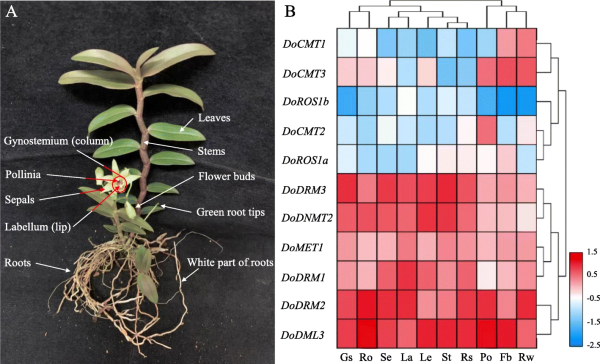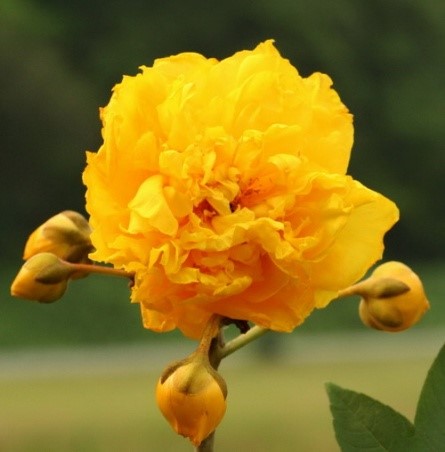

Dendrobium officinale, as a time-honored tonic food and precious Chinese herbal medicine, is an epiphytic orchid plant, which grows on the trunks, cliffs or rocks, and usually faces up to diverse environmental stresses (e.g. cold and heat stress, and water deficit). Plant DNA methylation, a conserved and important epigenetic modification, depends on the dynamics of antagonistic DNA methylation and DNA demethylation, but their roles in D. officinale are still unknown.
With the introduction of Prof. DUAN Jun, Dr. YU Zhenming from the South China Botanical Garden of the Chinese Academy of Sciences use a genome-wide analysis of cytosine-5 DNA methyltransferase (C5-MTase) and demethylase (dMTase) genes in D. officinale. Integrated analysis of conserved motifs, gene structures and phylogenetic analysis showed that eight DoC5-MTases were divided into four subfamilies (DoCMT, DoDNMT, DoDRM, DoMET), while DodMTases were divided into two subfamilies (DoDML3, DoROS1). Multiple cis-acting elements, especially stress-responsive and hormone-responsive ones, were found in the promoter region of all DoC5-MTase and DodMTase genes. RNA-seq derived expression profiling demonstrated DoC5-MTase and DodMTase displayed wide but distinguished expressions in different tissues and organs. Furthermore, we investigated the transcript abundance of DoC5-MTase and DodMTase under abiotic stress (cold and drought) and at the different seedling stage. Interestingly, most DoC5-MTases were downregulated, but DodMTases were induced by cold stress, because abiotic stress can cause variation in cytosine DNA methylation by generating novel epialleles, potentially affecting transcript abundance.
WSPs are important secondary metabolites and account for the commercial quality of D. officinale. During the different seedling stage, DoC5-MTase expression decreased as growth proceeded, but DodMTase expression increased. DNA methylation inhibits gene transcription, DNA demethylation enhances gene transcription. Taken together, DoC5-MTase and DodMTase may work together, affecting the accumulation of WSPs by regulating the level of DNA methylation. These findings will be helpful to reveal possible roles of DoC5-MTase and DodMTase in secondary metabolism and stress responses in D. officinale, and provide constructive clues for further exploration of the epigenetic mechanism of DoC5-MTase and DodMTase in orchids.
These results were recently published in BMC Plant Biology, entitled “Genome-wide identification and analysis of DNA methyltransferase and demethylase gene families in Dendrobium officinale reveal their potential functions in polysaccharide accumulation”.
For further reading, please refer to: https://doi.org/10.1186/s12870-020-02811-8.

Figure 1. Tempo-spatial expression patterns of DoC5-MTase and DodMTase genes in different organs of D. officinale

Figure 2. Transcript levels of DoC5-MTase and DodMTase genes, as well as the genes involved in the biosynthesis of water-soluble polysaccharides, at different developmental stages

